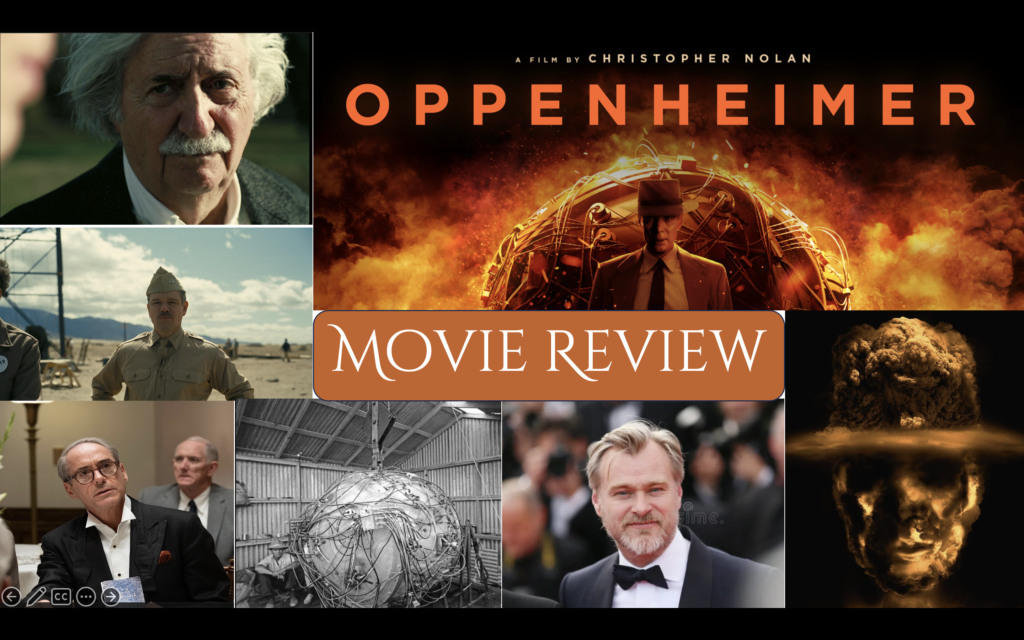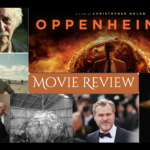
I’m not one to go watch movies at the drop of a hat, but I try not to miss some important movies (to my mind).
One such film was Oppenheimer. My interest was in the making of the atom bomb. I have known Oppie as the father of the bomb but knew little of him otherwise. Another motivation was it being a Christopher Nolan movie. I have been very enchanted by his story telling style, rather what he doesnt tell in the movie and makes us interpret. So took off on a Sunday morning 6:40 am show with my elder son in tow!
The film did not disappoint.
It was typical Nolan style where he was moving between two or three periods of time while narrating the same incident. Nolan’s movies are like a Wikipedia page with hyperlinks everywhere. A reader gets taken to multiple links while being on the same page (incident). Some we click, some we ignore and thats where the devil usually resides.
Usually he also packs a lot of science in it and this wasnt an exception. Much of the science is in the dialogue and also in the visual story telling. For example, when the bomb is tested in Los Alamos, the bright flash of the explosion is seen first, then comes the shock wave and much much later, the deafening sound. Many might take it to be for effect, but that is how it is in reality. Light travels faster than shock waves, which in turn, is faster than sound. The sound hits a full minute after the flash, accounting exactly for the distance between the test site and observation post. It is like these subtle unannounced, unmarked accurate visual communication in the film that one cherishes in a movie made by a director like Nolan.
There was science everywhere in the movie, split an atom, there was science…oops, split a scene, there was science. That aside, the movie is all about human nature. The interplay of emotions – raw ambition, betrayal, greed, envy, guilt were all in full play. No one, however rational – not scientists, not philosophers, not politicians – are immune to this. This is portrayed beautifully in its myriad shades across the spectrum. People torn between ideology, duty, romantic interests, science, personal ambition, loyalties and cold calculations were shown in Nolanesque style.
The one thing about Nolan I like is that he doesnt insult the intelligence of his audience and packs scenes visually for them to un-peel at their own pace.
Like the scene showing the impulsive nature of Oppenheimer- who out of spite that he isn’t allowed to attend Bohr’s lecture, poisons his professor’s apple. Only to be overcome by remorse, rushes to prevent him from eating it. I understand the second part wasn’t so dramatic in real-life Oppie’s life but Nolan packs a beautiful pun here. When Oppie snatches the apple from Bohr and bins it, he replies “wormhole” to Bohr’s question of why he did that. See that in the context Oppenheimer was working on black holes and Bohr on quantum field theory & time! Mischevous guy this Nolan! Back to the scene, I think he includes this in this 3 hr + movie to give us a clue about Oppie’s nature.
But the reason why Nolan chose to do a biopic on Oppie is pretty nicely buried in the movie to unpack. Among the other “rational” scientists, Oppie stands out in contrast. Not just his maladroit hands in the lab, gauche social skills, he has compunctions!!. Nolan projects him as a man with a heart, with its desires & morals. As with the remorse shown in the above scene, his empathy towards Spanish refugees and sympathies to the cause of communists add to his colourful character. But on the subject of the bomb and its potential to cause imaginable consequences, we get to see a chimaera in Oppenheimer. If you arent convinced, look at his different stances.
He knows fully well what making a bomb of that magnitude will do, yet he accepts the position. It might be the prospect that the enemy can get one or the ambition to head a historic project, which is a once-in-a-millennium opportunity for an ambitious scientist who is well regarded, yet not awarded by the Nobel committee.
In those discussions with fellow scientists on what the bomb could do and the morals of building it, he says they are just tasked with making it, not the ones to choose whether or where it will be used. Yet in the meeting to choose targets, he makes a feeble effort against using it. Feeble enough to register his protest but not strong enough to stop its use – so that the world can know what he has made.
In the moments after the bombing, he is proud of (himself and) his team that contributed to the Manhattan project and laments (mildly) it wasn’t ready soon enough to drop it on an already surrendered Germany.
And then after the deed is done and two entire cities are wiped out, he says that he feels like he has “blood in his hands” to Truman. If there had been a person who benefited the most from the Oppenheimer’s bomb project, it is Truman. So it is to him that he could have gloated over the victory and gotten what he wanted. Yet it is to Truman he projects himself as a wimp and gets dissed as a “cry-baby”.
Then begins his mission against more (potent) bombs. It could be genuine concern or the usual refrain of a hunter who turns a conservationist! We’ve seen enough of them from Jim Corbett to Kenneth Anderson.
It is this portrayal of the conflicted mind of Oppenheimer that makes this movie interesting. Now, conflicted mind brings Bhagavad Gita and Oppie’s brush with it.
Some people protest the presence & his quoting the Bhagavad Gita during a sex scene. But it is just that his partner takes a short break from the action, takes a look at his bookshelf and finds the BG in Sanskrit – which is a strange language for her.
She asks him if he can read the text. He says yes. She asks him to. He paraphrases. She objects and wants him to read as it is, which he does. By this time they are in action again.
Protesting this is childish. The lady was just curious about a book in a strange language and more so at his ability to read it.
The scene was a novel way in which Nolan showcases the breadth of Oppie’s reading interest which includes Indian philosophy that was in vogue amidst scientists of that era.
That was all there in it. No disrespect to the holy book.
The other scene which I dont recall if it was there is his quoting from the Bhagavad Gita that goes “I am become…”. This could have been a good scene to include, except that it may not have been understood by many in the audience (Western & probably many Indian too). Oppie had the confusions that Arjuna had too (maybe to a much lesser degree) and Oppie could have taken comfort from Krishna saying “Do your duty. There cannot be moral compunctions when you are a soldier or a scientist that needs to arm the soldier”. But I believe Nolan would have understood the real import of the nuanced meaning of “Dharma” and must have left it untouched. This is evident from the fact that Oppie was only momentarily a soldier (a kshatriya) when he decided to wear the military uniform but reverts back to who he is (a scientist who works for science & betterment of society) and changes into civilian clothes. I am not sure if this was planned this way to let us know who Opppie identified himself as, but I felt so as Nolan took trouble to include the scene.
Matt Damon brilliantly plays the role of a matter-of-fact, man-in-a-hurry, man-on-a-mission, pragmatic general who plans things to the last detail. Even after the tests, he doesnt take the time to celebrate but retreats quickly to report to the political class of the mission having been accomplished in time for the Potsdam conference and then goes incommunicado planning for the bomb’s use. Like a loyal soldier he informs Oppie only after the public announcement by Truman, of the bomb dropped in Hiroshima.
The cake for acting, in the role that is Nolan’s piece de resistance, should go to Robert Downey Jr. If you hadn’t seen the initial credits nor read about the cast before going to the movie, you would be so intrigued to know who this accomplished actor was that is playing the role of Lewis Strauss – the typical “anything goes”, cunning, manipulative & insecure politician. He brings out the visceral hate for him in the audiences’ mind and makes us root for Oppie to come out unscathed.
There are many sparks in the casting, the screenplay (the sage like depiction of Albert Einstein), and some nice memorable dialogues that makes the movie worth the while for having booked the Sunday morning 6:40 show.
What did I miss the most? The remote! There were many scenes that I wanted to go back to – either to watch it again or to understand better. So I will wait for it to come on OTT and watch it again.






Super sir… Its like watching a movie in your words… Lot of passion, enthusiasm and detailing…. Wonderful to read
Good review Sri
planning to watch tomorrow
Very nice write up. Choice of words is amazing, the enjoyment you had while viewing the movie to every detail possible is very evident. Just saw the movie this evening and read your review.
Loved the review…. Had the exact same thoughts on the movie. Loved the observations such as … Delay of sound during the trinity test or the wormhole pun. This review is a fresh breath of air for me considering how certain people considered the film ‘soul-less’.
[…] movies are for entertainment, but some are lessons. Here is a review of one such movie that helps us understand human nature, science, scientists and politicians […]